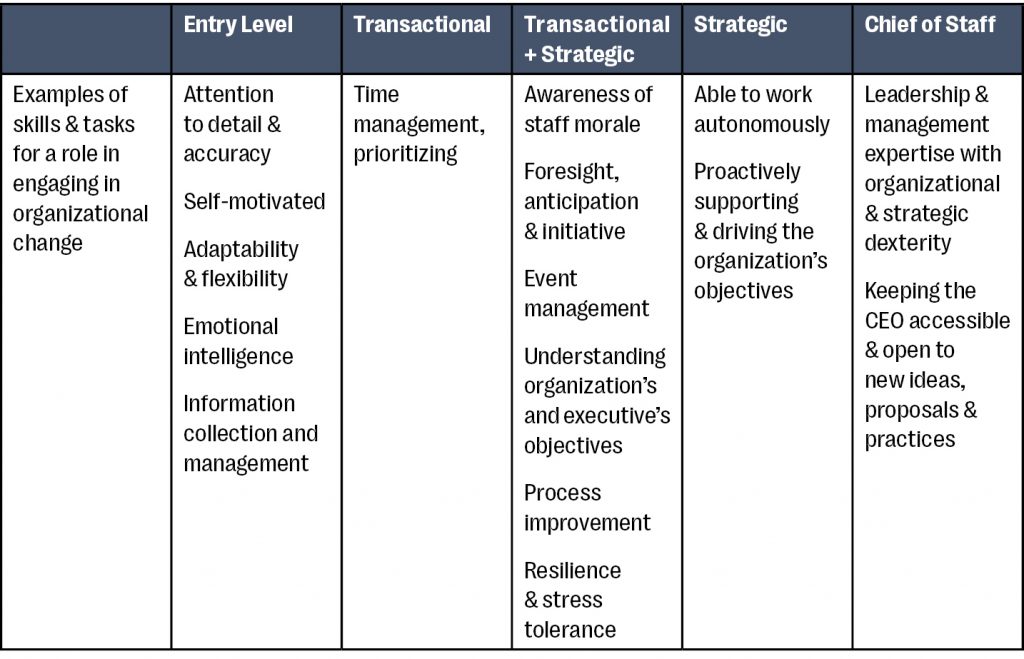
The Global Skills Matrix places assistants firmly in the role of catalysts for successful organizational change, explains Aliina Rowe
As an Executive Assistant, I’ve always been fascinated by organizational change. What makes it so important and impactful, but so difficult? After all, to understand how we handle change is to understand how we – both as individuals and as organizations – operate, progress, succeed and, sometimes, fail.
How organizations approach and steer change is evolving, and the role of the Assistant has become increasingly relevant and integral in building the foundations needed for successful organizational change. More than ever, Assistants need to proactively engage in building these foundations.
Succeeding in the organizational change landscape of today means involving employees at all levels and connecting people to each other. In doing so, we create inclusive and nurturing environments where individuals feel ready to engage with change.
Over the past year, I embarked on a journey to discover just how Assistants are approaching change in their roles. Along with studying change from an academic perspective, I focused my energy and effort on getting to know a wider Assistant network, attending Assistant training, and reading relevant books and articles from experts and fellow Assistants – all with an eye to howour role fits into organizational change and which approach may be best to take on the path to success.
How Do We Engage in Organizational Change?
Exploring the Assistant community connected me to inspiring, thoughtful, and engaging individuals. Not only are they the type of individuals you want by your side in any organization, but their skills and tasks match what is required in organizational change. Where change requires creativity and inclusiveness, Assistants are resourceful and welcoming. Where change requires listening and storytelling, Assistants are networked and engaged. And where change requires getting up and starting all over again, as it so often does, you’d better believe Assistants are resilient.
The training I attended highlighted just how valuable our role as Assistants can be in organizational change. Bonnie Low-Kramen’s BTUA workshop highlighted to me the importance of advocating for our role as a valued profession and supporting one another through change. Vicki Sokol Evans’ RedCape Academy demonstrated how Assistants can confidently be early adopters of technological changes and, critically, teach and pass that information on to others. Diana Brandl’s onboarding training session showed the importance of our role in welcoming new colleagues and being inclusive from day one. All these training sessions, along with several others available to us now, show how the Assistant role is key to building foundations for successful change.
The articles I discovered here in Executive Support Magazine explain several ways for Assistants to engage successfully in change. Julia Schmidt makes the case for the importance of the agility of Executive Assistants and, with Evon Wood, outlines the Big Opportunity Assistants have in their organizations as change agents. Lauren Parson’s articleshows us how to lead through uncertainty and change by remaining calm and demonstrating resilience. Doug Dickerson’s recent article makes transparent how change impacts our leadership and why we resist change, so that we can better embrace it in the future. These articles all highlight just how crucial it is for Assistants to get more comfortable seeing themselves engaging successfully in change and that there is no one single approach.
One of the most pivotal resources defining how Assistants engage in change is written in the Global Skills Matrix, recently published by the World Administrators Alliance. This matrix provides Assistants with an essential framework of skills and tasks at various levels in the administrative profession. You will not find the words “change agent” when searching the matrix, but you willfind the skills and tasks fundamental for organizational change at all levels.
Lucy Brazier OBE highlights how our skills define our role. When searching through the skills in the matrix, it is apparent that, no matter where we fall in the career progression scale, there is a role for Assistants in building foundations for meaningful change within our teams and alongside the leaders we support.
With so many evolving approaches to change, it may seem overwhelming to know how best to proactively start building foundations for successful change. But you have already begun. The Global Skills Matrix places assistants firmly in a role of catalysts for successful organizational change. You’ve either already got the skills that it takes or are on your way to developing them.
Start with SMALL – A New Approach

While the teams and executives we support are often busy focusing on high level strategy and objectives, Assistants are in the background, in the details, sweating the small stuff and getting things done.
As part of the administrative profession, the role of operationalizing strategy is key. All the juggling, calendar shuffling and prioritizing – as well as listening, storytelling and advocating the objectives of the leaders we support – has a role in organizational change. What may seem like “small” tasks can be powerful ways to start building foundations for change within your organization.
Small Matters
That “small” things matter is confirmed by research across the organizational change arena, and common wisdom tells us that small things don’t necessarily stay small; they have the potential for far-reaching impact. Indeed, the smallstuff can be the big stuff. What does this mean for you? Begin to engage in organizational change from wherever you are right now. Start small – and see how big an impact you can make.
Key skills from the Global Skills Matrix:
- Self-motivation
- Working autonomously
- Attention to detail
Being self-motivated and working autonomously can help you start to build foundations for change. What does a strong foundation for change look like? Individuals and teams who are connected and engaged. As the doers of your organizations, when it comes to organizational change there’s no need to wait for the vision statement to be completed before asking yourself: What can I start now that is doable and may make a difference in connecting and engaging my colleagues?
Paying attention to detail also matters in change. Debra Meyerson writes in Rocking the Boat: How Tempered Radicals Effect Change Without Making Trouble, “change often lies in the details of organizational life – in everyday practices, mundane interactions, and normal ways of understanding.”
As an example, it matters how the room is set up for a hybrid meeting to maximize inclusivity, and it matters who you remembered to include at the last minute. This could make the difference in someone feeling connected and engaged, which is essential for effective change.
Mindset Matters
Key skills from the Global Skills Matrix
- Adaptability and flexibility
- Time management and prioritizing
- Keeping the CEO accessible and open to new ideas, proposals and practices
All research points to the mindset of leaders as being fundamental in setting the stage for successful organizational change. Assistants must approach change aware of the importance of making this shift. Being adaptable and flexible is key.
A mindset for change is best served by a nurturing environment. Cultivating a nurturing environment in organizations requires time, space and focus. Successful time management and prioritizing can help create this environment, allowing time and space to pause and reflect, as well as keeping your executive accessible and open to new ideas, proposals and practices.
Acquire and Assess Information
Key skills from the Global Skills Matrix
- Information collection and management
- Understanding key business areas and organizational objectives
- Emotional intelligence and awareness of staff morale
We need good information to engage in change. Assistants are uniquely positioned in their organizations to collect and manage information through their expansive contacts and exposure to information at all levels in an organization. Acquiring and assessing information allows Assistants to understand key business areas and organizational objectives when it comes to change.
One type of information to assess is staff morale. Using emotional intelligence is key in identifying any frustrations and understanding different perspectives. Paying attention to stories and narratives being told in our organizations is an important aspect of bridging any gaps of understanding to successfully connect and engage individuals in change.
Leverage Information
Key skills from the Global Skills Matrix
- Foresight, anticipation and initiative
- Team building and relationship skills coupled with event management
- Proactively supporting and driving the organization’s and executive’s objectives
We know change can be hard and resistance is likely. Often resistance comes from lack of information, causing anxiety and uncertainty. Assistants can use foresight, anticipation and initiative to proactively bridge information gaps by sharing facts or data on change initiatives that people may have missed. The less anxious or uncertain people are, the more likely they are to engage positively with change.
Did someone miss a presentation because they were unable to attend a meeting? Is a new colleague lacking context for a project that’s about to kick off? Has the team missed an offer of training on new tools within your organization? Passing on the document, getting the new colleague up to speed, or letting people know where to sign up for training on the new tool can all contribute to people engaging in change in a better way.
Assistants can also use their team building and relationship skills along with event management skills to connect and engage colleagues. Where might there be a need for individuals to come together? Is there an opportunity to connect individuals who could benefit from each other’s knowledge? Has there been progress made that’s worth celebrating? Building up teams, connecting people for shared knowledge and coming together for celebration can have significant impact in building foundations for change.
Proactively supporting and driving the organization’s and executive’s objectives can steer individuals on a path to successful change. As Assistants, we are sensitive to people’s emotions and staff morale. We listen to stories and narratives and interpret how change may be progressing (or not) within our organizations. Listening for disconnects and then bridging any gaps in understanding of objectives can be a powerful way to steer change. Bear in mind that simply repeating objectives may only create silence and disengagement. Interacting and engaging with individuals when advocating objectives can better bridge gaps and help in collectively engaging people in change.
Learn
Key skills from the Global Skills Matrix
- Process improvement and problem solving
- Strategic thinking, understanding and knowledge
- Resilience and stress tolerance
Simply put, we can and must learn about organizational change. Being reflective and asking questions is an ideal place to start. Answering those questions can lead us to reconsider and re-engage in new and more informed small ways.
Improving processes and solving problems is what change is all about. What isn’t working? Is there an opportunity to improve? Asking where there is room for change allows us to begin.
Strategic thinking, understanding and knowledge allow us to connect the dots. Asking the following questions can put us on a path for successful change: Who might have a different perspective? How is this change being interpreted? What could we learn more about?
Being resilient and tolerating stress allows us to continuously learn and engage with change. Collectively being open to learning together in our organizations will allow us to maintain momentum while learning how to do those small things even better.
EAs Approaching Change Through Small Steps
Imagine the impact we can have as a profession when proactively using our skillset and viewing our role as essential in organizational change. By turning attention and focus on what can be done now, in small ways, we can engage and connect people to each other, building strong foundations for organizational change.
Questions to ask
- Where can you start now to connect and engage individuals in change?
- Are you contributing to creating a nurturing environment for a mindset for change?
- Are you paying attention to relevant information available to you needed for change – including both practical knowledge and staff morale?
- Can you proactively provide people with information they may be lacking? How can you bridge information gaps and advocate for your organization’s objectives?
- Where could you create momentum?
- Are there opportunities for you or your team to do better? How could you start again?
Use the skills you’ve got with an eye towards engaging in change. Try starting with SMALL and see just how big an impact you can make!
An Adaption of the Global Skills Matrix for Organizational Change















A great article Aliina, thank you for highlighting the value of the Global Skills Matrix as a tool for organisational change.
Thank you Helen for your comment, the Global Skills Matrix has so much value.
Appreciate the mention, dear Aliina….